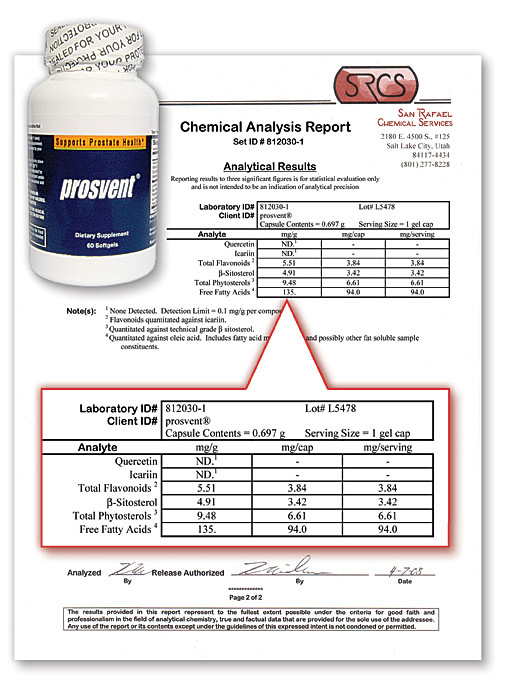|
Prosvent Review
Maybe you have seen the half-hour television infomercial for Prosvent featuring UCLA educated physician Dr. Larry May. The show and commercials do a terrific job of reviewing how important it is for men to be proactive in caring for their prostate. Dr. Larry May goes on to explain that to eliminate or at least minimize the chance of developing BPH, men should take his Prosvent pills. Talk about biased!
Prosvent contains all the key ingredients of a good prostate supplement: saw palmetto, pygeum, Vitamin D & E, zinc, selenium and pumpkin seed oil as well as lycopene. We reviewed the laboratory tests with average scores. This supplement was nowhere near the high scores of Prostavar or some of the better prostate supplements.
However, Prosvent is good enough to help some men with mild prostate enlargement or mild BPH. The only complaint about Prosvent is that it costs $79 a bottle. The high price might be necessary because of the high cost of purchasing the TV infomercial spots. Bottom line is this is a decent product.
Prosvent Basics: Rich in antioxidants, herbs and essential vitamins, there's a lot to like about Prosvent—numerous testimonials, solid ingredients and quick-dissolving capsules make it an ideal choice for men over age 40. Like other prostate supplements, Prosvent also makes good use of Saw Palmetto, a sterol-rich extract used to treat benign prostatic hypertrophy (BPH), or an enlarged prostate. But that's not all—they also include zinc, antioxidant-rich extracts, and vitamins D and E to reduce a man's prostate cancer risk. Prosvent is a solid, safe formula that may work, and it definitely has people talking.
Prosvent Ingredients: Prosvent contains all of the usual prostate supplement ingredients: Saw Palmetto, pygeum extract, lycopene and selenium. It also contains nettle root extract, vitamin E, vitamin D and the cancer-fighting mineral zinc, which is also rich in antioxidants.

Does Prosvent Work?: Maybe. According to a study reported in the American Journal of Medicine, pygeum extract significantly lowered urological symptoms caused by an enlarged prostate, including bloody or painful urination, frequent nocturnal urination and incomplete emptying of the bladder. Another study also showed it reduced all symptoms of prostatitis, a painful inflammation disease, in 89% of participants.
Saw Palmetto also reduced some symptoms of an enlarged prostate, including obstructed urine flow, frequent urges to go and bladder pain. This also reduced some prostate inflammation, improving prostate health.
Early (but inconclusive) studies on lycopene also suggest it may lower the risk for developing many cancers, including breast, cervix, colon and prostate cancer. Some people suggest it specifically lowers prostate cancer, but this isn't true—other studies found that lycopene was about as effective as placebo pills. It's really not clear how lycopene affects the prostate, though it won't cause any harm.
But other vitamins and minerals, including zinc, may reduce a man's risk for developing prostate cancer. Several studies show it inhibits the multiplication of cancerous prostate cells, essentially stopping the cancer from spreading. But it won't cure prostate cancer, and overuse is actually linked to an increased risk of cancer.
Is Prosvent Safe?: Yes. If used correctly, these ingredients won't cause any significant side effects, making it safe for everyday use.
Grade: C. Prosventis effective, but there is not enough evidence its ingredients are more effective than other prostate supplements, such as Prostavar or Vasotrexx. Lycopene is also not proven to reduce a man's prostate cancer risk. Play it safe—use a more effective prostate supplement instead. Prosvent earns a solid C from us.
Prosvent is available direct from the manufacturer at www.prosvent.com or by calling them at 1-800-743-9854
|